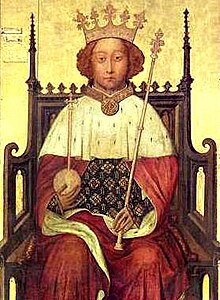King Richard II of England
| Richard II | |
|---|---|

Portrait at Westminster Abbey, mid-1390s
|
|
| King of England (more...) | |
| Reign | 21 June 1377 – 30 September 1399 |
| Coronation | 16 July 1377 |
| Predecessor | Edward III |
| Successor | Henry IV |
| Born |
6 January 1367 Bordeaux, Duchy of Aquitaine |
| Died | c. 14 February 1400 (aged 33) Pontefract Castle, Yorkshire |
| Burial | Westminster Abbey, London |
| Consort |
Anne of Bohemia (m. 1382–1394) Isabella of Valois (m. 1396–1400) |
| House | House of Plantagenet |
| Father | Edward, the Black Prince |
| Mother | Joan, 4th Countess of Kent |
| Signature |  |
Richard II (6 January 1367 – c. 14 February 1400), also known as Richard of Bordeaux, was King of England from 1377 until he was deposed on 30 September 1399. Richard, a son of Edward, the Black Prince, was born in Bordeaux during the reign of his grandfather, Edward III. Richard was the younger brother of Edward of Angoulême, upon whose death, Richard, at three years of age, became second in line to the throne after his father. Upon the death of Richard's father prior to the death of Edward III, Richard, by primogeniture, became the heir apparent to the throne. With Edward III's death the following year, Richard succeeded to the throne at the age of ten.
During Richard's first years as king, government was in the hands of a series of councils. Most of the aristocracy preferred this to a regency led by the king's uncle, John of Gaunt, yet Gaunt remained highly influential. The first major challenge of the reign was the Peasants' Revolt in 1381. The young king played a major part in the successful suppression of this crisis. In the following years, however, the king's dependence on a small number of courtiers caused discontent among the influential, and in 1387 control of government was taken over by a group of aristocrats known as the Lords Appellant. By 1389 Richard had regained control, and for the next eight years governed in relative harmony with his former opponents.
In 1397, Richard took his revenge on the appellants, many of whom were executed or exiled. The next two years have been described by historians as Richard's "tyranny". In 1399, after John of Gaunt died, the king disinherited Gaunt's son, Henry of Bolingbroke, who had previously been exiled. Henry invaded England in June 1399 with a small force that quickly grew in numbers. Claiming initially that his goal was only to reclaim his patrimony, it soon became clear that he intended to claim the throne for himself. Meeting little resistance, Bolingbroke deposed Richard and had himself crowned as King Henry IV. Richard died in captivity in February 1400; he is thought to have been starved to death, although questions remain regarding his final fate.
...
Wikipedia
